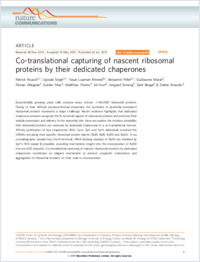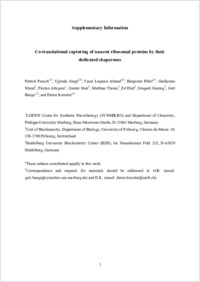Co-translational capturing of nascent ribosomal proteins by their dedicated chaperones
- Pausch, Patrick
- Singh, Ujjwala Unit of Biochemistry, Department of Biology, University of Fribourg, Switzerland
- Ahmed, Yasar Luqman
- Pillet, Benjamin Unit of Biochemistry, Department of Biology, University of Fribourg, Switzerland
- Murat, Guillaume Unit of Biochemistry, Department of Biology, University of Fribourg, Switzerland
- Altegoer, Florian
- Stier, Gunter
- Thoms, Matthias
- Hurt, Ed
- Sinning, Irmgard
- Bange, Gert
- Kressler, Dieter Unit of Biochemistry, Department of Biology, University of Fribourg, Switzerland
-
26.06.2015
Published in:
- Nature Communications. - 2015, vol. 6, p. 7494
English
Exponentially growing yeast cells produce every minute >160,000 ribosomal proteins. Owing to their difficult physicochemical properties, the synthesis of assembly-competent ribosomal proteins represents a major challenge. Recent evidence highlights that dedicated chaperone proteins recognize the N-terminal regions of ribosomal proteins and promote their soluble expression and delivery to the assembly site. Here we explore the intuitive possibility that ribosomal proteins are captured by dedicated chaperones in a co-translational manner. Affinity purification of four chaperones (Rrb1, Syo1, Sqt1 and Yar1) selectively enriched the mRNAs encoding their specific ribosomal protein clients (Rpl3, Rpl5, Rpl10 and Rps3). X-ray crystallography reveals how the N-terminal, rRNA-binding residues of Rpl10 are shielded by Sqt1’s WD-repeat β-propeller, providing mechanistic insight into the incorporation of Rpl10 into pre-60S subunits. Co-translational capturing of nascent ribosomal proteins by dedicated chaperones constitutes an elegant mechanism to prevent unspecific interactions and aggregation of ribosomal proteins on their road to incorporation.
- Faculty
- Faculté des sciences et de médecine
- Department
- Département de Biologie
- Language
-
- English
- Classification
- Biological sciences
- License
-
License undefined
- Identifiers
-
- RERO DOC 257055
- DOI 10.1038/ncomms8494
- Persistent URL
- https://folia.unifr.ch/unifr/documents/304594
Other files
Statistics
Document views: 105
File downloads:
- pdf: 231
- Supplementary material: 174

